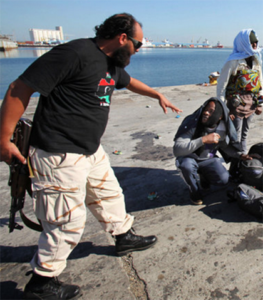African migrants being killed and abused – UN report
Thousands of refugees and migrants are dying or suffering extreme human rights abuses on journeys between West and East Africa and the continent’s Mediterranean Coast, according to a new report from the UN’s refugee agency.
The report, titled ‘On this journey, no one cares if you live or die’, says the majority of people taking these routes suffer or witness violence or abuse at the hands of people smugglers, traffickers, militias and sometimes even police or state officials.
 It says a minimum of 1,750 people died on these journeys in 2018 and 2019.
It says a minimum of 1,750 people died on these journeys in 2018 and 2019.
This represents a rate of least 72 deaths per month, making it one of the most deadly routes for refugees and migrants in the world.
The deaths on top of the thousands who have died or gone missing in recent years attempting to cross the Mediterranean Sea to Europe after reaching north African shores.
Around 28 per cent of deaths reported in 2018 and 2019 happened as people attempted to cross the Sahara Desert, the report said.
It said other hotspots for fatalities included Sabha, Kufra, and Qatrun in southern Libya, the smuggling hub of Bani Walid south-east of Tripoli and several places along the West African section of the route including Bamako and Agadez.
At least 70 refugees and migrants are known to have died in 2020 already, including at least 30 people were killed at the hands of traffickers in Mizdah in late May.
“The men, women and children who survive are often left with lasting and severe mental health issues as a result of the traumas they faced,” the report said.
“For many, their arrival in Libya is the final staging post on a journey characterized by horrific abuses including random killings, torture, forced labour and beatings.
“Others continue to report being subjected to brutal violence, including being burnt with hot oil, melted plastic, or heated metal objects, electrocution and being tied in stress positions,” it said.
The report said women and girls, but also men and boys, were at high risk of rape and sexual and gender-based violence, particularly at checkpoints and border areas, and during desert crossings.
“Some 31 per cent of respondents interviewed… who witnessed or survived sexual violence in 2018 or 2019 did so in more than one location,” the report said.
“Smugglers were the primary perpetrators of sexual violence in North and East Africa, accounting for 60 per cent and 90 per cent of the reports from the respective routes.
“However, in West Africa, the primary perpetrators were security forces/military/police officials, accounting for a quarter of reported abuses,” it said.
Many people reported being forced in to prostitution or other forms of sexual exploitation by traffickers, the report said.
“Between January 2017 and December 2019, UNHCR recorded over 630 cases of trafficking of refugees in eastern Sudan, with nearly 200 women and girls reporting being survivors of sexual and gender-based violence,” the report said.
It said once inside Libya, refugees and migrants are at risk of suffering further abuses, as the ongoing conflict and weak rule of law means smugglers, traffickers and militias are often able to act with impunity.
Launching the report by UNHCR and the Danish Refugee Council, UN High Commissioner for Refugees Filippo Grandi said the harrowing abuses experienced by refugees and migrants along these routes have been largely invisible,
“This report documents killings and widespread violence of the most brutal nature, perpetrated against desperate people fleeing war, violence and persecution,” Mr Grandi said.
“Strong leadership and concerted action are needed by states in the region, with support from the international community, to end this cruelty, protect the victims and prosecute the criminals responsible,” he said.
Read the full report: https://www.unhcr.org/5f1ab91a7












